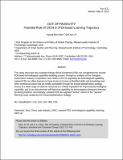| dc.contributor.author | Nam, Kyung-Min | |
| dc.contributor.author | Li, Xin | |
| dc.date.accessioned | 2014-09-12T18:06:31Z | |
| dc.date.available | 2014-09-12T18:06:31Z | |
| dc.date.issued | 2012-09 | |
| dc.identifier.issn | 0960-6491 | |
| dc.identifier.issn | 1464-3650 | |
| dc.identifier.uri | http://hdl.handle.net/1721.1/89472 | |
| dc.description.abstract | This study discusses how outward foreign direct investment (FDI) can complement the inward FDI-based technological capability-building process, through an analysis of the Shanghai Automotive Industry Corporation case. When a firm is upgrading its technological capability, outward FDI can allow learners to have access to human-embedded skills and knowledge and other intellectual assets that are hardly accessible through the inward globalization strategy. Access to a wide range of external resources is a critical ingredient for improving technological capability, and it can also promote self-learning capability by encouraging subsequent learning-by-doing practices. Accordingly, outward FDI can augment “active” nature in the “passive” learning mode created by the inward globalization strategy. | en_US |
| dc.description.sponsorship | Massachusetts Institute of Technology. Center for International Studies | en_US |
| dc.description.sponsorship | Massachusetts Institute of Technology. Department of Urban Studies and Planning | en_US |
| dc.description.sponsorship | Massachusetts Institute of Technology. Joint Program on the Science & Policy of Global Change | en_US |
| dc.language.iso | en_US | |
| dc.publisher | Oxford University Press | en_US |
| dc.relation.isversionof | http://dx.doi.org/10.1093/icc/dts031 | en_US |
| dc.rights | Article is made available in accordance with the publisher's policy and may be subject to US copyright law. Please refer to the publisher's site for terms of use. | en_US |
| dc.source | Nam | en_US |
| dc.title | Out of passivity: potential role of OFDI in IFDI-based learning trajectory | en_US |
| dc.type | Article | en_US |
| dc.identifier.citation | Nam, K.-M., and X. Li. “Out of Passivity: Potential Role of OFDI in IFDI-Based Learning Trajectory.” Industrial and Corporate Change 22, no. 3 (September 10, 2012): 711–743. | en_US |
| dc.contributor.department | Massachusetts Institute of Technology. Department of Urban Studies and Planning | en_US |
| dc.contributor.department | Massachusetts Institute of Technology. Joint Program on the Science & Policy of Global Change | en_US |
| dc.contributor.approver | Nam, Kyung-Min | en_US |
| dc.contributor.mitauthor | Nam, Kyung-Min | en_US |
| dc.contributor.mitauthor | Li, Xin | en_US |
| dc.relation.journal | Industrial and Corporate Change | en_US |
| dc.eprint.version | Author's final manuscript | en_US |
| dc.type.uri | http://purl.org/eprint/type/JournalArticle | en_US |
| eprint.status | http://purl.org/eprint/status/PeerReviewed | en_US |
| dspace.orderedauthors | Nam, K.-M.; Li, X. | en_US |
| dc.identifier.orcid | https://orcid.org/0000-0002-4579-4815 | |
| mit.license | PUBLISHER_POLICY | en_US |
| mit.metadata.status | Complete | |
